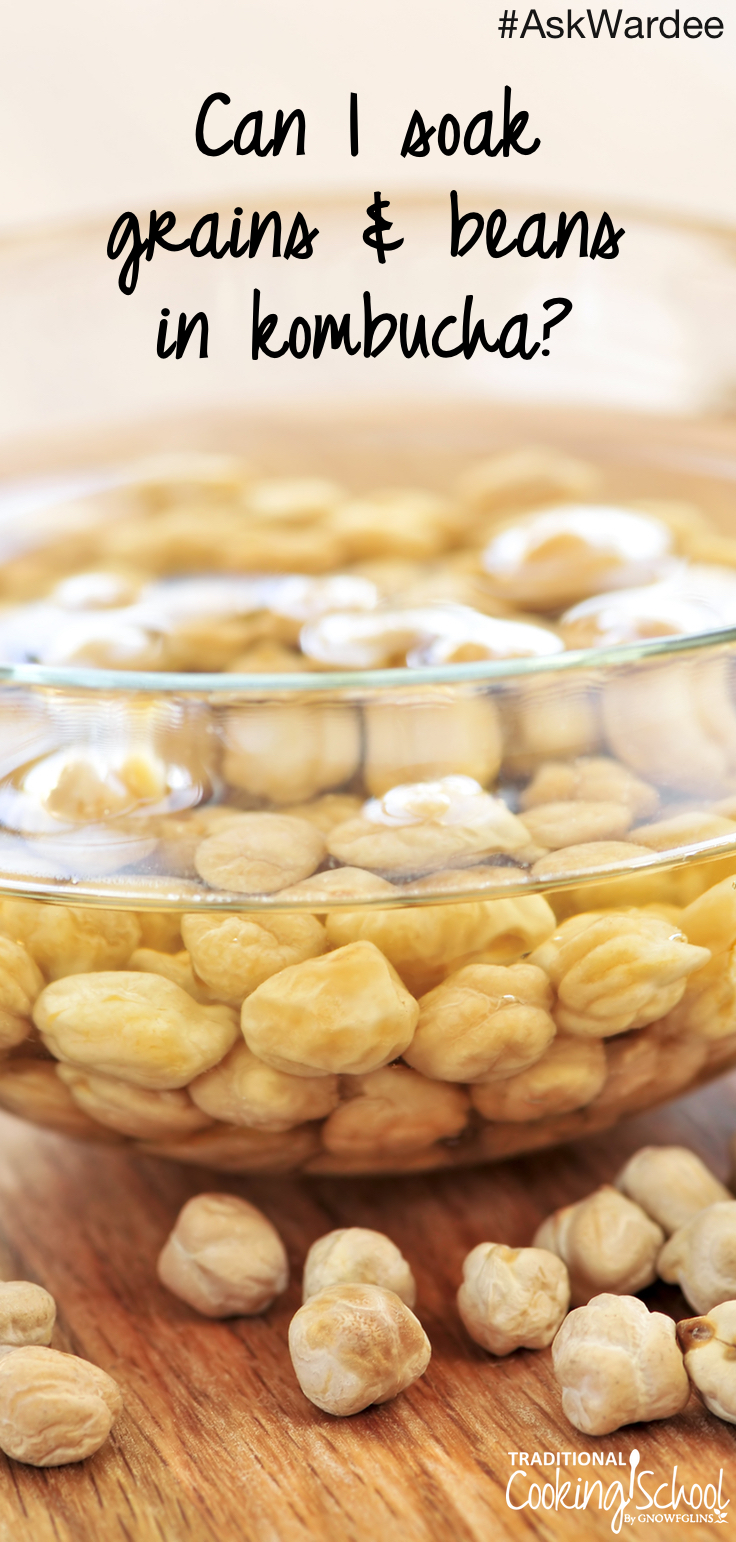
Alyssa F. asks, “Hi! I am curious if I can use Kombucha instead of apple cider vinegar, whey, or lemon juice when soaking grains or legumes the night before?” on today’s #AskWardee.
I broadcast #AskWardee live each Wednesday at 10am Pacific (1pm Eastern) on Periscope and Facebook Live. Both the podcast and video replay of this week’s show are below. Enjoy!
Subscribe to #AskWardee on iTunes, Stitcher, YouTube, or the Podcasts app.
The Question
Alyssa F. says:
“Hi! I am curious if I can use kombucha instead of apple cider vinegar, whey, or lemon juice when soaking grains or legumes the night before?”
The Answer?
Yes! You can use Kombucha instead of those acids! But I won’t leave it there…
1. What is soaking and why soak?
Grains and beans (and all seeds, including nuts and seeds) have anti-nutrients like phytic acid and enzyme inhibitors that can interfere with digestion and lead to mineral deficiencies. When you soak with an acid medium, the anti-nutrients are neutralized during the soaking period and resulting in a more digestible and nutritious dish.
2. How to soak?
You simply combine the grain or bean with water (or another liquid) and an acid such as apple cider vinegar, lemon juice, Kombucha, water kefir, dairy kefir, yogurt, or plain white vinegar for 7 to 8 hours or overnight.
I have video instruction for soaking grains and beans in my free Traditional Cooking Video series — sign up if you haven’t already!
3. What is Kombucha and why does it work as a substitution?
Kombucha is a fermented, probiotic beverage that contains acids. Because it’s acidic, it works as a straight substitution for apple cider vinegar or any other acid. Go for it!
Here’s my recipe for Kombucha.
4. Why would you want to use Kombucha?
- It’s all you have.
- You have a lot of Kombucha to use up.
- You prefer the flavor of it in the end product (it can be less sour).
- Because it has beneficial organisms, it can enhance the soaking through the actions of the organisms, which consume starches and sugars in what you’re soaking, making it even more digestible! (Similar to raw apple cider vinegar or other soaking acids that have beneficial organisms.)
Links Mentioned:
What Is The #AskWardee Show?
The #AskWardee is the live weekly show devoted to answering your niggling questions about traditional cooking: whether it’s your sourdough starter, your sauerkraut, preserving foods, broth, superfoods or anything else to do with Traditional Cooking or your GNOWFGLINS lifestyle.
I share tips and resources, plus answer your questions about Traditional Cooking!
The Details
When: Wednesdays at 10am Pacific / 1pm Eastern
Where: @TradCookSchool on Periscope or Traditional Cooking School on Facebook
What If You Can’t Make It?
Don’t worry. You can catch the replays or listen to the podcast!
- Come back here to AskWardee.TV; all replays will be up within hours of airing live; the print notes are always posted at the same time I go live.
- Follow @TradCookSchool on Periscope or Traditional Cooking School on Facebook to view the replay.
- Subscribe to the #AskWardee podcast on iTunes, Stitcher, YouTube, or the Podcasts app. While you’re there, be sure to leave a rating and review!
Want To Get YOUR Question Answered?
Here’s how to submit your question. If we answer it on #AskWardee, you’ll get a gift!
Or, you can…
- Tweet your question to @TradCookSchool on Twitter; use hashtag #AskWardee
- Send an email to wardee at AskWardee dot tv — add #AskWardee to your email so I know it’s for the show
Please do NOT add future questions for #AskWardee to the comments of this post because they might get missed!
Have you ever soaked grains and beans with kombucha?
This simple tutorial on soaking brown rice is a great place to start!
Be sure to subscribe to my channel on YouTube! Go here to subscribe.
We only recommend products and services we wholeheartedly endorse. This post may contain special links through which we earn a small commission if you make a purchase (though your price is the same).


I have never heard of soaking beans in ACV, lemon juice or the other acidic liquids. I have always used just plain water. Do you just add a certain amount of acidic liquid or is all of the liquid used acidic?
Thanks